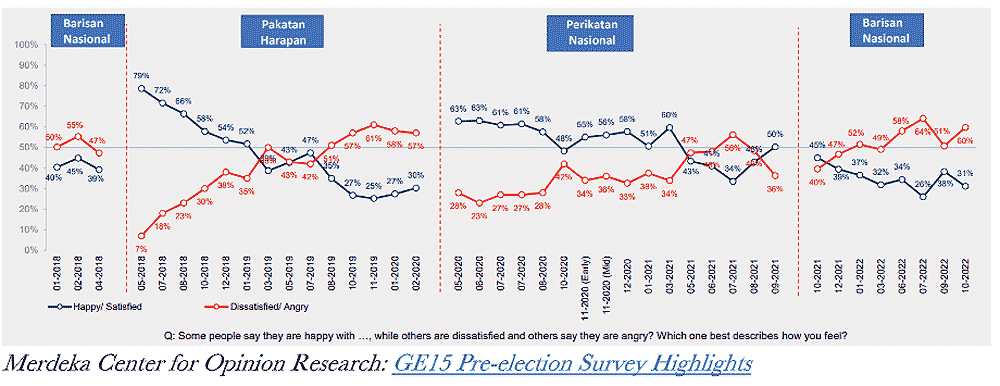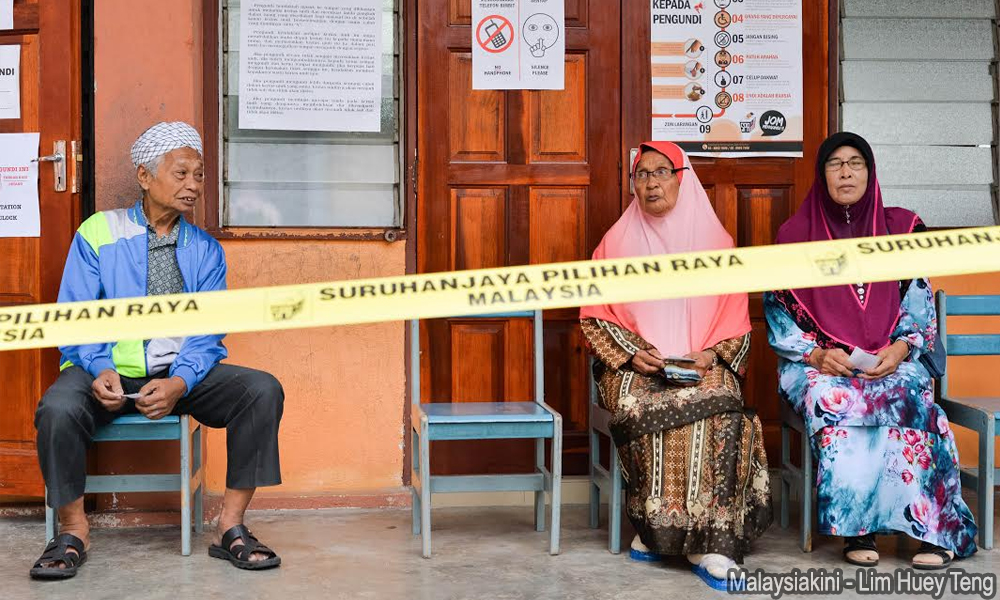It’s awful to say this, but if Pakatan Harapan wins in GE15, it could be because of Sheraton Move.
Like many Malaysians, I could not forget the night of Feb 23, 2020 as I saw MPs entering Sheraton Hotel smiling and waving as they complete the final plot to overthrow a democratically-elected Harapan government through mass defections. The protracted week of negotiations, backstabbing, lying, crying, horse-trading, and interviewing that led to an entirely new government left a permanent scar in my psyche.
I could not see Sheraton Move as anything else than what it was – treachery of the highest order by a group of dishonest and self-interested politicians.
But I saw a graph two weeks ago that made me ask an uncomfortable question: Could Sheraton Move have been a good thing for the primary victim, Harapan?
Independent pollster Merdeka Center had been tracking government approval ratings with sufficient one- to three-month intervals since Harapan first came to power in 2018. This meant that we could compare how people felt about the three governments of Harapan, PN, and BN in the past four years.

No government in recent history has been as popular at Harapan during its first two months of administration, as euphoria painted the sky in our first-ever government change since independence. But this popularity took a dramatic crash in the next 20 months, ending only with a 30 percent approval rate in its final month before Sheraton Move swept them out of power. If an election was called then, nobody would bet on a Harapan victory.
Two global crises
Whether it was an expectation-reality mismatch, underperformance, and/or inexperience, but the people were much happier when Muhyiddin Yassin took over, as PN’s government enjoyed an above 55 percent approval rating during its first year.
But things plunged rapidly from April 2021 onwards, reaching an all-time low of 34 percent in July 2021. This was when the violent Omicron variant hit, putting Covid-19 cases past 1 million, making Malaysia’s per-million deaths Southeast Asia’s highest; hospitals became a disaster movie. The lockdowns economically distressed many, with suicide rates soaring to record highs, and starving Malaysians put out white flags to plea for help.
Ismail Sabri Yaakob’s government took over as the economy looked for ways to recover from the once-in-a-lifetime pandemic-induced downturn. Ismail Sabri’s government was never able to breach 50 percent in approval ratings, and the dissatisfaction rate rose to the highest level of 64 percent at the height of inflation (July 2022). The war in Ukraine and unexpected lockdowns in China disrupted the supply chains, driving food prices sky high. Cooking oil, eggs, and creamer had double digit price increases. We ran out of chicken.

Without Sheraton Move, the unpopular Harapan government would have had to govern through the life-threatening Covid-19 crisis and unprecedented inflation, both of which were due more to external events that were highly uncontrollable, but which governments typically take full blame. Now, three major coalitions that governed in the past four years are compared by how well they have done during their tenure, and most importantly, how the people felt during those periods.
While Harapan’s governance was associated with lacklustre pace in reforms, its administration now looks better compared to Muhyiddin’s Covid-19 dark and bitter statistics, as well as Ismail Sabri’s angry inflation period. Other than yanking Harapan out of these unavoidable global crises, Sheraton Move also allowed people to reflect on their performance with more distance and objectivity, and to soften how they felt about Harapan, in direct contrast to PN and BN governments that were closer in time.
Splitting the opponents
Besides making Harapan look better with the power of nostalgia, Sheraton Move also produced two other benefits to Harapan: Split its opponents and lowered the threshold for victory.
When the deal was struck to orchestrate Sheraton Move, rule-breaking behaviours were normalised. Chief among them was the notion that every politician deserves to be in the cabinet, and they would withdraw support and threaten the party if their demands were not met. By validating politicians’ egoistic pursuit of wealth and influence in cabinet positions, large-scale internal and external party feuds happened between PN and BN.
A new faction within Umno was formed purely to defend their positions against other party vultures, and they were known as the “minister cluster”. Those not aligned with Umno president, Ahmad Zahid Hamidi, were dropped as candidates, and they either made Zahid the target enemy, cried betrayal, or ran on the opponent’s ticket altogether.
Despite the logical electoral benefit of a PN-BN partnership, talks also fell through as Umno and PAS started blaming each other for the government’s faults and corruption, and name-calling occurred to a grave degree between them that a ceasefire was called. Such schisms could not have existed without Sheraton Move that legitimised the lust for power and made the coalitions realise that they could not work together or compete for the same voter base.

Before Sheraton Move, Umno-PAS was working intimately under Muafakat Nasional. After Sheraton Move, greed was unleashed and celebrated, splitting the oldest Malay-Muslim parties and normalising nationwide three-cornered fights. A more competitive election meant that the Malay votes are split, thus improving Harapan’s chances to win with only a quarter of Malay votes. The endless feuds also made the uneventful Harapan appear stable in comparison. Sheraton Move opened the floodgates of greed, and Harapan now benefits.
The final benefit of Sheraton Move is the birth of the anti-party hopping law that improved the rules of the game. The intensity and frequency of party defections made parties realise they were all losers in a zero-sum game if they could not keep the MPs they’ve helped win. Though imperfect, the anti-hopping law, in effect from Oct 5, 2022, makes it a constitutional requirement for an MP to vacate his/her seat if they join another political party.
This helped lower the threshold for victory. A Harapan that wins only 90 seats under anti-hopping law environments is more secure than a Harapan that has 121 seats in 2018 when MPs were still allowed to defect to another party. The anti-hopping law helps Harapan cement its seats and influence, thus making it more attractive for East Malaysian parties to strike a partnership to form government. That also meant Harapan needs fewer seats as its seats are now stabler seats.
What good was Sheraton Move? The grave affront to our democracy that broke all rules and conventions turned out to be beneficial to the primary victims, Harapan. It helped provide a contrast to other governments that governed during the worst crises and made Harapan look better in comparison, besides splitting the opponents through the floodgates of greed, and lowered the threshold of victory by improving the rules of the game.
If Harapan goes on to win GE15, it could be because of Sheraton Move. - Mkini
JAMES CHAI is a political analyst. He also blogs at www.jameschai.com.my and he can be reached at jameschai.mpuk@gmail.com.
The views expressed here are those of the author/contributor and do not necessarily represent the views of MMKtT.




No comments:
Post a Comment
Note: Only a member of this blog may post a comment.